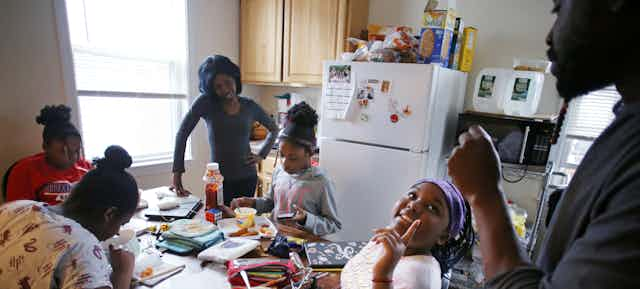About 55 million U.S. schoolchildren attend schools that have been closed or are being directly affected by the new coronavirus social distancing rules. Erika London Bocknek, a family therapist who studies early childhood development, parenting and family resilience, encourages parents and others raising kids to focus on the 4 R’s: routines, rules, relationships and rituals.
1. Routines
A good routine should create a pattern each day for a child that is predictable. But there are many ways to do that besides setting up a traditional schedule. New strict schedules may increase anxiety for some kids, especially if the transitions between one activity and the next seem arbitrary. To create predictability outside the constraints of a traditional school schedule, consider holding daily morning meetings to set priorities. Families can use that time to clearly communicate, sort out expectations and remind one another of what’s ahead, from online chats with teachers to when lunch will be to who will do which household chores or where to go on an afternoon walk. Older children can write those priorities down to use as checklists. Little kids benefit from daily reminders about what they can look forward to throughout the day.
Several studies, including some I’ve conducted, have consistently found that sticking with dinnertime and bedtime routines in particular is good for positive mental health outcomes throughout childhood.
Even if families opt for a model that’s more flexible than what kids are used to on school days, consistency is key. For example, kids and adults should have at least one meal at about the same time every day together. That meal is a good opportunity for everyone to spend time together free of electronic devices and other distractions. To be clear, the gathering itself matters as much as what’s on the table. These types of routines anchor the day, and research shows that they organize children’s external worlds in ways that support self-regulation, the building block of good mental health. In addition, predictable family environments help children feel like their homes are stable and supportive – which is especially important when under stress.
2. Rules
While parents and other guardians may see fit to reduce expectations and ratchet down demands, they should stick with the rules that matter most in the long term for their families. For example, it may be reasonable to relax expectations about tidiness or screen time. However, families should maintain rules about safety and kindness and be consistent with consequences. Children of all ages feel and behave better with predictable family rules.
Parents and other caregivers may want to set new family rules at this time, such as requiring kids to do more chores and share in household responsibilities. Such rules may instill some of the independence, community obligation and social engagement that students otherwise experience at school.
3. Relationships
As families find themselves spending more time together, responsible adults should reflect on their own mood and behavior. Children don’t need perfect parents to thrive, but they do benefit from parenting they find predictable. For example, children should be able to anticipate how their parents or other caregivers will typically interact with them and how the most important adults in their lives will respond to stress. It’s OK for those adults to let on that they’re feeling stressed out, as long as children see them coping with these feelings in safe and appropriate ways.
Kids fare best when their moms, dads and other caregivers are warm and responsive when directly interacting with them. This doesn’t require nonstop attention and, in fact, attempts to sustain direct attention throughout the day may detract from adults’ overall capacity to provide this kind of positive attention. Aim instead for planned moments of focused, positive interaction even if brief and repeat throughout the day.
4. Rituals
Any special routine can become a family ritual – which are predictable and help every family member feel like they belong to a special group. Research shows that rituals support good mental health in childhood because of the previously mentioned sense of family organization and the added benefit of family cohesion that gives children a positive sense of their identity.
Taco Tuesdays and regular movie nights work, as do religious practices like bedtime prayers. I’ve found that rituals that connect children to previous generations may be particularly powerful, so this could be a good time to revive and adapt a beloved ritual from your own childhood. Or create new family rituals together. Especially during periods of uncertainty like this pandemic, rituals make it clear to kids that their families are stable and strong.
[The Conversation’s newsletter explains what’s going on with the coronavirus pandemic. Subscribe now.]

